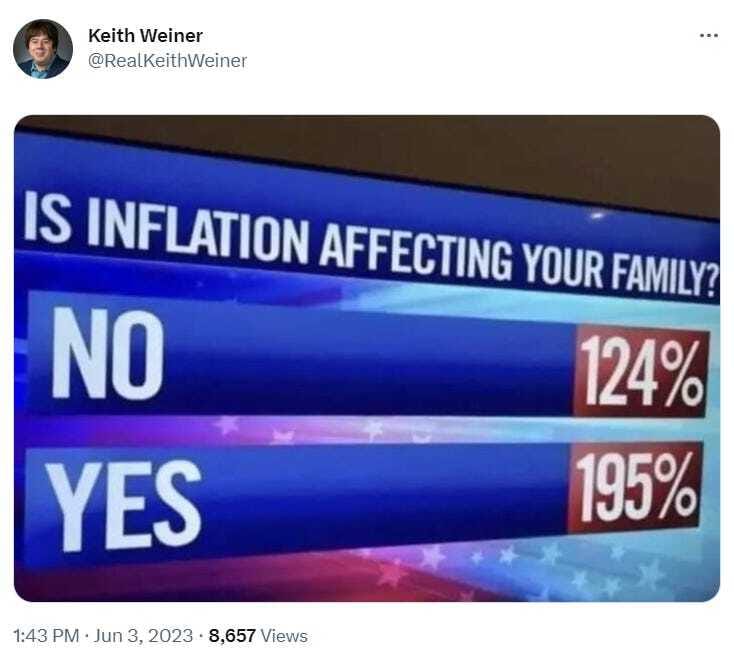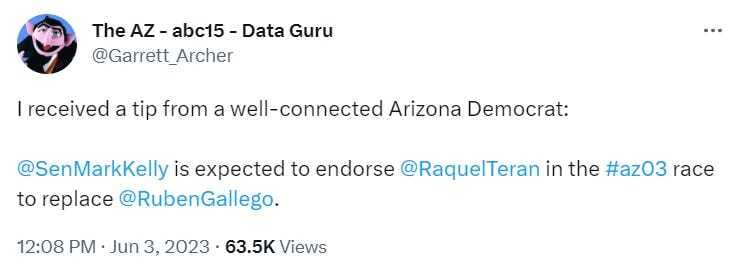The three-year deal that Arizona, California and Nevada signed last month to conserve water and stave off federally mandated cuts was a huge breakthrough for the long-deadlocked Lower Basin states that provides some breathing room before a bigger renegotiation on Colorado River water rights commences in 2026.
But last week’s announcement from Gov. Katie Hobbs that the Valley doesn’t have enough groundwater to meet expected growth in the next 100 years is a stark reminder that water will be an increasingly disruptive force in the Southwest’s near future.
For decades, Arizona has attempted to have it all. The state’s economy is built on the endless growth of (until recently) cheap housing in faux-lush communities. We’ve wooed water-sucking high-tech industries like microchip plants while simultaneously appeasing farmers growing water-intensive crops. We’ve never had to make either/or decisions.

That’s about to change, as Rhett Larson, a professor of water law at Arizona State University, told the Washington Post this weekend. And it’s not going to be pretty.
“We want to be the greatest semiconductor and microchip manufacturer in the world. We can do that. We have enough water, but our food prices are going to go up because we’re not going to grow as much food,” Larson told the Post. “Those are the hard conversations that Arizona has to have right now.”
The multi-state agreement should leave enough water in the river for the next few years to avoid “deadpooling,” or stopping the flow of water, which would kill hydropower and potentially leave not enough water to even get through the dams and make it downstream. That deal was made possible by a wet winter that relieved pressure on negotiators and a massive pool of federal money that’ll essentially pay farmers, cities and other water users to not use water.
But simply having the federal government buy up water that doesn’t exist isn’t a real solution to the problem, Substacker Robert Robb argues. While it might have been the only way to get the states to agree immediately, supply and demand are out of whack, and the long-term solution is a market to facilitate free-market water sales between municipalities, though that’s probably a few years out at least, Robb notes.
“The huge pool of taxpayer money approach isn’t sustainable. A robust water market for direct purchases would be,” Robb writes.
And there’s no guarantee that the plan will even provide the stopgap necessary to get us through the next three years and into the next round of negotiation, as Dr. Sharon Megdal, director of the University of Arizona’s Water Resources Research Center in Tucson, explained on “Science Friday,” this week.
“If we follow this very wet winter with multiple very dry winters, this agreement may have to be adjusted and more cutbacks put in place,” Megdal said.
In the meantime, Hobbs’ announcement has the potential to drive up housing and food prices and curtail the Valley’s growth-dependent economy. Homebuilders were quick to warn that the already stretched housing supply will get thinner if suburbs can’t build, and that employers could be deterred from moving here as a result.

The few cities that are directly impacted are downplaying the effect of the new construction rules. But clearly it’s going to cause an economic shakeup in the long term. Even Phoenix, which isn’t directly impacted by the new construction limitations, is getting calls from concerned potential residents, Phoenix water advisor Cynthia Campbell told the Republic’s Taylor Seely and Alexandra Hardle.
"We're now at the point where people call up and say, 'Should I move there? Are you guys running out of water?" Campbell said. "But it's a perception issue, not a factual issue."
The New York Times says the construction limitation “very likely means the beginning of the end to the explosive development that has made the Phoenix area the fastest growing metropolitan region in the country.” But the Republic’s water columnist Joanna Allhands noted it’s not quite that bad yet, as the restrictions don’t include most commercial or industrial developments, apartments or single-family homes that are built to rent.
While Arizona’s new water reality may not be the beginning of the end of the suburban sprawl that defines the landscape, it may be the beginning of the end of Arizona’s ability to say yes to everything. Difficult decisions lie ahead.

No vacation for Hobbs: Gov. Katie Hobbs is directly negotiating with GOP legislative leaders to bring forward some kind of extension of Proposition 400, the Maricopa County transportation sales tax, when lawmakers convene later this month, but she’s being cagey about how those negotiations are going, Bob Christie reports for Capitol Media Services. Meanwhile, Hobbs announced she’s spending $25 million to help fight border crime in Somerton, Wellton and Yuma, as well as the Cocopah tribe, though she didn’t say which municipalities would receive how much, the Republic’s Stacey Barchenger reports.
Good for newsletters, bad for Arizona: Time digs into the will-she-won’t-she Kari Lake Senate run, and decides she will, probably in September or October. While Mark Lamb is already in the GOP primary race, Blake Masters and Jim Lamon are waiting to see what Lake does, Time writes. She’d be nearly impossible to defeat in a primary, most Republicans agree, and she’d have a fighting chance in the general election.
“She could have won (the governorship) if she bought a f-cking ticket to Hawaii and left,” Arizona consultant Chuck Coughlin told Time. “Honest to God, if she just shut up, she would have won.”
Losers lose in court: The Arizona Republican Party lost its bid to outlaw early voting after the state Supreme Court, without comment on Friday, declined to hear AZGOP’s appeal of its previous court losses, Capitol scribe Howie Fischer reports. Meanwhile, gubernatorial sore-loser Lake is once again appealing to the Supreme Court after losing her legal argument to overturn the 2022 election.

One school, two school, red school, blue school: A secular group called the Freedom From Religion Foundation warned Peoria School Board members to stop citing scripture at their meetings or risk getting sued, KJZZ’s Matthew Casey reports. (The district’s lawyer agreed it’s not a good idea.) And after banning police or school resource officers from its campuses in 2020, Phoenix Union High School District is inviting them back as part of a broader school safety plan, the Republic’s Yana Kunichoff writes.
“But whoever causes one of these little ones — who believe in me — to stumble and sin by leading him away from my teaching, it would be better for him to have a large millstone hung around his neck and to be drowned in the depths of the sea.” Matthew 18:6, which was among the versus Peoria School Board Member Rebecca Hill read at a board meeting.
Let them stay in school: According to federal law, students who have significant cognitive disabilities have the right to remain in public school until their 22nd birthday. But many are forced to graduate early, cutting off their access to friends and necessary services, KJZZ’s Amy Silverman reports. Part of the reason schools are forcing them out is that their ability to graduate special-ed students in four years is included in schools’ state-issued letter grade.
In this market?!: The Pima County Flood Control District is buying and demolishing five houses in the ritzy Catalina Foothills neighborhood of Tucson to open the floodplain. The houses, which the district will pay $3.7 million for, were built before the floodplain was established, the Daily Star’s Henry Brean explains.
“One of the homes was operating as an assisted living facility until July 31, when 10 residents had to be rescued by firefighters during a flash flood that filled the building with several feet of water,” Brean writes.
Just some normal discourse: Lake Havasu Mayor Cal Sheehy is suing a right-wing podcast host after he called the mayor a “pedophile,” among other things, for supporting the city’s Pride parade. The mayor received death threats after Stew Peters’ podcast aired in September last year. And the cast pits two of Arizona’s top election law attorneys against each other. Tim La Sota, who represented Kari Lake in various lawsuits, is backing the podcast host, while former Arizona elections director Eric Spencer is representing the mayor, Today’s News-Herald’s Michael Zogg writes.

Anything you say can and will be used against you: The former Phoenix police officer who arrested Arizonan Ernesto Miranda and sparked the “Miranda rights” case died, the Associated Press reports. Although Miranda’s first rape conviction was overturned because police didn’t tell him his rights, Capt. Carroll Cooley eventually got his man and Miranda was convicted on the second try.
Watch them fight: The Arizona Senate’s Committee on Director Nominations is set to consider Hobbs’ Department of Corrections Director, Ryan Thornell, Tuesday, along with Hobbs’ pick to lead the Department of Real Estate, Susan Nicolson.
Bedbugs and credit cards: Nogales hired an outside consultant to audit Mayor Jorge Maldonado’s city credit card, and there are some big red flags, the Nogales International’s Angela Gervasi writes. Consultants said the mayor made purchases without proper documentation, he had spent money on ineligible travel reimbursements and spent much more than his predecessors on his inauguration. The consultants said the spending could conflict with the Arizona State Constitution and federal tax law. Meanwhile, the Santa Cruz County courthouse may reopen today after being closed down last week to fumigate a bedbug infestation, the Nogales International notes.


Kari Lake released a new single, “81 million votes my ass,” recorded with members of the J6 Prison Choir, a group of prisoners arrested for their role in the January 6 riots. The group also recorded a song with Donald Trump earlier this year.
They plan to release “more of these songs, and each one will be a quote-unquote truth bomb.”
On the bright side, if her music career takes off, perhaps she’ll stop running for political office.
